Economic and Social Changes: Facts, Trends, Forecast @volnc-esc-en
Статьи журнала - Economic and Social Changes: Facts, Trends, Forecast
Все статьи: 1763
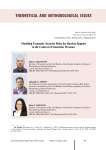
Modeling economic security risks for Russian regions in the context of sanctions pressure
Статья научная
The article investigates the problem of ensuring Russia's economic security in the conditions of increasing sanctions pressure. In order to assess and analyze emerging risks, we propose a multifactorial model that considers the economic security of Russian regions as a complex multidimensional system influenced by various interrelated risk factors. We use a list of indicators for monitoring and assessing Russia's economic security, approved by Presidential Decree 208, dated May 13, 2017. For the purpose of risk modeling, we establish two-level threshold values (“soft” and “hard”) of indicators based on expert assessment. The information base of the study includes data of the Federal State Statistics Service for Russia, as well as data in the context of constituent entities of the Ural Federal District by month for the period from January 2016 to March 2023. According to the calculation results, the aggravation of sanctions imposed by unfriendly countries has negatively affected the economic security of Russia as a whole and that of constituent entities of the Ural Federal District. Within the analyzed period, the risks created are significantly lower in comparison with the consequences of the COVID-19 pandemic, and they tend to decrease. Regional analysis shows that the most significant risk factor is the condition of agriculture, which has been significantly affected by the quarantine and sanctions restrictions imposed. Modeling economic security risks for Russian regions on the basis of the proposed approach in dynamics will help to promptly assess the current situation and put forward management recommendations in a timely manner, when economic security is compromised.
Бесплатно
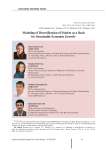
Modeling of diversification of market as a basis for sustainable economic growth
Статья научная
The article considers the issue of dependence of key macroeconomic indicators on the energy supply price dynamics, especially oil price, relevant to the modern Russian economy. In order to overcome the negative trends related to oil price dynamics, the authors propose to consider the measures on the gradual diversification of the Russian economy as an effective tool of state regulation. To test the hypothesis that diversification contributes to the increase in sustainability of the national economic system, the authors review the simultaneous equations model, the endogenous variables of which include structural values which reflect the structure of national production system. The share of gross value added (hereinafter, GVA) generated in the i-th sector in the total GVA and the base GVA index generated in the i-th sector similar to the industry output index sequentially serve as endogenous variables in this study. The test of the hypothesis was carried out in two stages: at the first stage, according to the results of econometric modeling, the indicator of the real effective ruble exchange rate to foreign currencies was chosen as the main exogenous variable; at the second stage, the basic system of equations was evaluated...
Бесплатно
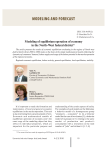
Modeling of equilibrium operation of economy in the north-west federal district
Статья научная
The article presents the results of economic equilibrium evaluating in the regions of North-west federal district from 2000 to 2008 made on the basis of the simple mathematical models reflecting the dynamics of consumers’ demand, labour supply and usage of the labour potential in the market operation of the regional economy.
Бесплатно
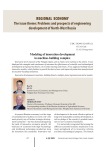
Modeling of innovation development in machine-building complex
Статья научная
Innovative level research of the Vologda region and its trades were realized at the article. It was displayed the strengths and weaknesses of outcomes the effectiveness of scientific-and-technological development of regional machinery, its recently meaning and trends. It was suggested multiple-factor innovative models, which furthers to growth the share of new and improved production manufactured by machine-building enterprises.
Бесплатно

Modeling renewable electricity production in Azerbaijan
Статья научная
Azerbaijan is an oil-rich country in the South Caucasus with great potential for developing the renewable energy sector, which currently accounts for only a small share of total energy production. Increased electricity generation from renewables can bring various economic and environmental benefits, such as greater energy security, sustainability and resource conservation, decentralized power generation, technological innovation, and climate change mitigation. Although there are a growing number of studies on Azerbaijan’s green energy or energy transition, the dynamics of its relatively longitudinal per capita renewable electricity generation have not been fully explored. Moreover, most studies ignore the role of technological change and profound institutional and policy variables in the energy transition. Our study fills this gap by applying dynamic ordinary least squares modeling (DOLS) on annual data to identify the key economic, institutional, and policy determinants in the period from 1990 to 2021. We reveal that economic variables such as oil prices, trade openness, CO2 emissions, accession to the Kyoto Protocol, and crisis periods were positively and statistically significantly associated with renewable electricity production in Azerbaijan. However, institutional quality variables (e.g., government effectiveness), GDP per capita, and primary energy consumption were negatively and statistically significantly associated with renewable electricity. Our findings hold the potential to furnish essential insights into enhancing renewable energy production across both short- and long-term horizons. Consequently, policymakers, decision-makers, and scholars stand to gain valuable insights from the outcomes of our research.
Бесплатно
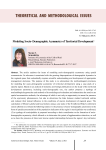
Modeling socio-demographic asymmetry of territorial development
Статья научная
The article explores the issues of modeling socio-demographic asymmetry using spatial econometrics. Its relevance is associated with the growing disproportions of demographic dynamics in the regional space that undoubtedly requires scientific understanding and development of appropriate management decisions. The purpose of this study is to substantiate the methodological provisions for modeling the socio-demographic asymmetry of territorial development using a case-study of a specific region. Based on an analysis of domestic and foreign publications on the study of the territorial development asymmetry, including socio-demographic one, the author proposes a typology of methodological approaches and methods of its modeling and evaluation and substantiates the need to use spatial econometrics methods, the advantage of which is not only an opportunity to assess the presence of the asymmetry phenomenon, but also to determine the links between studied territorial entities and evaluate their mutual influence in the conditions of uneven development of regional space. The calculation of Moran’s global and local indices using a case study of the Sverdlovsk Oblast’s settlement system allowed us to obtain the following results: (1) the presence of socio-demographic asymmetry in the form of spatial autocorrelation of the population indicators of the region’s municipalities was confirmed; (2)a typology of municipalities is proposed according to their contribution to the formation of socio-demographic asymmetry, which allowed us to determine the points of agglomeration attraction, as well as to show the presence of direct and inverse spatial relationships between the region’s key territories; (3) the author substantiates the trend of increasing socio-demographic asymmetry in the region as a result of the increasing role of the Yekaterinburg agglomeration and the decline in the value of other two attraction points in the settlement system. The results obtained can be used by interested specialists to justify measures to regulate the socio-demographic and spatial development of the region by using positive and leveling negative effects of the socio-demographic asymmetry.
Бесплатно
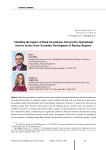
Статья научная
Banking capital plays a significant role in providing the financial foundations for the development of institutional sectors in regional systems, which include financial and non-financial corporations, households, public administration sector and foreign institutions. However, a study of the processes of banking capital flows between them shows that the banking sector currently does not perform its traditional functions of saving institutional sectors’ capital and providing them with loans, but carries out a speculative policy, contributing to a significant outflow of financial resources abroad and causing serious harm to the Russian economy. In this regard, the purpose of the work is to study the imbalances in the processes of banking capital flows between institutional sectors and to model the impact of bank investments attracted by institutional sectors on the socio-economic development of constituent entities of the Russian Federation. We have developed a methodological approach based on the methodology of forming balanced matrices of financial flows between institutional sectors using data from the primary accounting statements of loan institutions, the methodological principle of double entry bookkeeping of the System of National Accounts and methods of regression analysis using panel data. We built matrices of financial flows in the regions, characterizing the processes of bank capital flows between the sector of financial and non-financial corporations, public administration, households and foreign institutions, regression models characterizing the impact of bank investments attracted by each institutional sector on the indicators of socio-economic development of regional systems. The study has found that the capital raised by banks in the sector of non-financial corporations has a positive impact on the dynamics of the gross regional product of Russia’s constituent entities, leads to a decrease in unemployment in the regions, the number of people with incomes below the subsistence level, the degree of capital consumption, as well as an increase in the balanced financial performance of enterprises and the average monthly nominal wage.
Бесплатно
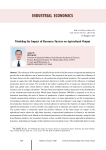
Modeling the impact of resource factors on agricultural output
Статья научная
The relevance of the research is justified by the need to find the sources of agricultural production growth due to the effective use of resource factors. The purpose of the work is to model the influence of the labor factor and the capital factor on the production of agricultural products. The research method consists in using the Cobb-Douglas production function to build a model of the influence of enlarged production factors on output. The novelty of the author's approach lies in using cost characteristics of labor and capital costs, which allows to obtain more reliable indicators of elasticity by presenting the resource costs in a single calculation. The data from international statistics presented in the development of the international research project World Input-Output Database (WIOD) is proposed to be use as indicators describing the costs of factors of production. Capital expenditure is characterized by the Capital compensation indicator; to estimate labor costs, it is more appropriate to use the Compensation of employees indicator, which reflects labor costs in the form of employees' total wages. Calculations of the production function for various time intervals allowed to estimate the elasticity of output of Russian agricultural production in terms of labor and capital costs in absolute and relative terms in retrospect. The author makes a conclusion about the priority influence of the labor factor on output in the agricultural sector, about the high labor intensity of agricultural production in Russia in the absolute measurement of labor costs. Based on the obtained parameters of the production function, using the data from Russian statistics, the researcher presents a three-variable forecast of gross agricultural production dynamics, depending on changes in labor productivity and capital return. The models built allow to make predictive assessments of the industry complexes development, and can also be used in the development and adjustment of the main directions of the state agricultural policy for the effective use of the resource potential.
Бесплатно
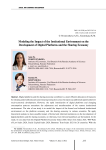
Статья научная
Digital platforms and the sharing economy contribute to a more efficient allocation of resources by releasing underutilized assets and reducing transaction costs; this opens up additional opportunities for socio-economic development. However, the rapid introduction of digital platforms and changing consumption patterns necessitate the adjustment and transformation of the current institutional environment. The aim of our study is to model the impact of the formal and informal institutional environment on the platform economy and the sharing economy in various countries. We apply theoretical analysis to show possible impact of formal and informal institutions on the development of digital platforms and the sharing economy; on this basis, four relevant hypotheses are formulated. In the study, we use data from the Digital Platform Economy Index 2020, Smart City Index 2021, WJP Rule of Law Index 2020, Social Capital Index 2020, Barometr Trust Index 2021 for 26 countries. With the help of a correlation and regression analysis, we construct linear models demonstrating the impact of the formal institutional environment on the development of the platform economy, as well as the influence of informal institutions on the services of the sharing economy. We prove that a low level of corruption and the transparency of public administration are major factors in the formal environment that affect this type of activity. The informal environment is characterized by the level of trust and social contacts in the country, expressed through social capital. The novelty of our findings consists in determining the nature of influence of the formal and informal institutional environment on the development of the sharing economy. The significance of the results lies in the possibility of using the identified patterns for the development of digital platforms and the sharing economy
Бесплатно
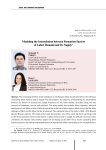
Modeling the interrelation between formation factors of labor demand and its supply
Статья научная
The remaining problem of the imbalance on the Russian labor market determines the relevance of studying labor demand and its supply. For this purpose, the objective of identifying the interrelation between the factors of demand and supply formation on the labor market, described using two sets (vectors) of indicators, was set and achieved. The study model also includes labor migration, informal employment, and labor activity of elderly population as factors of labor supply, which ensure that the labor shortage is filled, and the labor market is balanced. The statistical base of the study is 2006-2018 Rosstat data for Russian regions. The results of the study showed that, since 2014, there has been a growing trend in the interconnection between the factors of labor demand and its supply. In difficult macroeconomic conditions, the Russian labor market adapts not by freeing up the labor force, but by expanding labor relation practices (including underemployment of population) while maintaining a low unemployment. Economic decline has led to a reduction in the need for labor, which, on the background of a narrowing supply of labor resources caused by population ageing, has strengthened the balance between supply and demand on the labor market. The growth of partial and part-time employment has become a key process in reconciling the demand for labor and its supply. The inclusion of all factors, studied in this research, in the model allowed us to assess their impact on the balance of labor demand and supply. Employment of population aged 60-72 years was the most significant factor among all supply and demand indicators on the labor market, which indicates a high potential of ensuring their balance.
Бесплатно
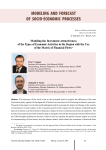
Статья научная
The relevance of the work is due to the increased need to improve the efficiency of the state investment policy against the background of limited external sources for financing investment processes. The goal of the paper is to develop methodological tools for assessing the impact of changes in the volume of investments in fixed capital on the economic growth of the regions for the purpose of identifying the types of economic activities that have the greatest impact in terms of national economic development. The novelty of our approach consists in the fact that we integrate two tools for assessing investment effectiveness: the Cobb-Douglas production function, which is used to calculate the growth of gross output as a result of commissioning of fixed assets; and the balance model, which shows the movement of financial flows in the region (matrix of financial flows) and which is used to calculate direct and indirect economic effects arising from investment activities. We calculate and analyze sectoral production functions for four regions with different specialization and level of socio-economic development - the Sverdlovsk, Vologda, Chelyabinsk and Kurgan oblasts; we also calculate the marginal return on capital in 16 types of economic activity. We build matrices of financial flows for the regions under consideration for the year 2016, on the basis of which we calculate four groups of sectoral multipliers, reflecting the impact of the growth of gross output in individual industries on the aggregate growth of gross output (in the economy of the region as a whole), value added, household income and consolidated regional budget revenues. The paper shows that the cumulative effect manifested in growing GRP and tax revenues of the regional budget due to the growth of fixed capital, depending on the industry, may differ several times. Our study identifies statistical anomalies that indicate significant flaws in the data available; this fact prevents us from obtaining more accurate results. The approach we have developed and the results we have obtained can be used by the authorities to work out investment policy, taking into account the regional sectoral specifics of multiplicative economic effects.
Бесплатно
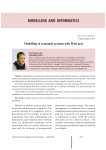
Modelling of economic systems with Petri nets
Статья научная
Modelling is one of the most important tools to study complex systems. Components of both continuous and discrete nature are present in the behavior of contemporary economic systems. The article uses formalism of nested hybrid Petri nets as a tool to study complex economic systems. The author describes basic approaches of simulation modelling, concepts of classical Petri nets, modified means of nested hybrid Petri nets, benefits of their use for systems modelling. The article presents the concept of a universal system of simulation modelling. On the basis of considered approaches the article proposes to develop a universal system of simulation modelling on the basis of the modified machine Petri nets.
Бесплатно
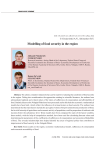
Modelling of food security in the region
Статья научная
The article considers indicators that can be used for evaluating the condition of food security in the region. Taking into consideration the approaches existing in scientific literature, the authors have substantiated optimal and critical values of the ratios of sufficiency of consumption and affordability of food. Statistical data on the Vologda Oblast have been processed and on this basis the economic-mathematical models have been built, which reflect the influence of various factors on food security. The authors have determined that the main factors include the per capita volume of import and domestic production of food, the level of intensity of agriculture and economic activity of population, and the proportion of residents with incomes below the subsistence level. Trend models have been composed for each of the factor variables; these models, with the help of extrapolation method, have been used for calculating forecast values and determining the parameters of the coefficients of sufficiency of consumption and economic affordability of food. The revealed relationships have helped identify key areas of regional policy that contribute to improvement of food security in the Vologda Oblast.
Бесплатно
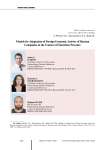
Статья научная
Investigating models for adapting foreign economic activity of Russian companies to the sanctions pressure of unfriendly countries is relevant, since it is necessary to form approaches to obtaining data on trends and priority strategies for overcoming negative consequences in the current situation. The aim of the work is to assess trends in the use of models that help to adjust foreign economic activity of Russian companies to the sanctions pressure. Research methodology is based on economic analysis methods; application of foreign economic activity adaptation models is reflected using objective indicators that characterize the dynamics of revenue, net profit and investments of companies after the application of restrictions in connection with the economic sanctions of unfriendly countries. The research findings indicate that the inability to replace a large number of raw materials included in the value-added chain has maintained the level of demand for export goods and formed a high motivation for mediation in foreign economic transactions, which made it possible for Russian companies to implement an adaptive export switching model. Adaptation to import restrictions, based on differentiated high-value goods, is carried out bypassing sanctions by companies from unfriendly countries due to the lack of alternative sales markets. Despite the generally favorable position of Russian companies, about a third of enterprises were unable to successfully reorient product sales to new international destinations, which led to a reduction in revenue by the end of 2023. Also, about a third of the companies that showed revenue growth compared to 2021 experienced a reduction in financial performance, which indirectly indicates an increase in costs due to the use of the import switching model. Although the import figures show a pre-crisis level in general, the cost of imports has increased significantly, due to the complexity of logistics and the formation of a chain of intermediaries. Data on the use of the adaptation model of international cooperation show that large enterprises do not use this mechanism due to the risks of secondary sanctions for foreign partners. The findings contribute to the methodology for studying models of companies’ adaptation to sanctions pressure by forming methodological foundations for determining the directions to adjust foreign economic activity based on the current system of statistical observation. The developed methodological foundations, along with survey methods for obtaining information related to models for Russian companies’ adaptation to sanctions, can be used to monitor the identified issues and verify research on relevant topics.
Бесплатно
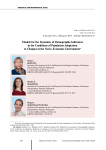
Статья научная
Socio-economic development of any territory is inherently connected with population reproduction, which is predetermined by demographic behavior. Recently, the models for the dynamics of Russia's demographic indicators have been changing, which is characterized by a decrease in the birth and death rates, as well as a relative stabilization of the migration situation. The transformation of demographic dynamics models is a natural result of society's adaptation to the new socio-economic reality. The changes in the behavior of the population are particularly noticeable under the conditions of abrupt transformations of the external environment, observed in the transitional periods of socioeconomic systems functioning. In this regard, the purpose of the study was to determine the main models of the dynamics of demographic indicators of the Russian Federation at the present stage of development, which is characterized by a rapid change in the conditions of life activity. Based on the use of the concept of adaptation in the “human-environment” coordinates, we showed the two-dimensional adaptation of the population to changes in the external environment and constructed a decision-tree for the acts of demographic behavior. In empirical part of the study, using methods of logical and statistical analysis, we studied the dynamics of indicators of reproductive, self-preservation and migration behavior of the population in the period from 2000 to 2019, using, respectively, a set of indicators of birth rate, mortality, life expectancy and migration growth. Based on highlighting the specific characteristics of Russia's socio-economic development in 2000-2006, 2007-2015, and 2016-2019, we identified three stages of demographic indicators dynamics, in accordance with which we proposed three models of demographic indicators dynamics, in order to expand our understanding of this phenomenon. The results obtained allowed us to form a methodological basis for future interdisciplinary research in the field of demographic behavior. They can also be used as a methodological basis for the development of demographic policy measures.
Бесплатно
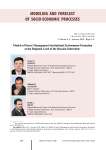
Статья научная
The experience of effective forest management in the most developed forest countries proves the important role of the institutional environment in this process. Taking into account the territorial specifics is a necessary condition for its formation. In the Russian Federation, there has been a long-standing controversy about the ineffectiveness of the institutional environment existing in forest management. First of all, this applies to the institution of forest plots lease defined in the Forest code. As a rule, the discussions are based on the general indicators of forest development reducing the objectivity of individual elements evaluation. In this regard, one of the most important tasks at the moment is creating a methodology and tools allowing to obtain the estimates related to the development of individual elements of the forest management institutional environment, in particular, the elements of the forest lease system. The main purpose of the research is to develop the general approaches in order to analyze the dynamics of the environment elements formation associated with the lease of forest plots in the region of the Russian Federation and obtain the appropriate models on this basis. To achieve this goal, the system of forest lease in the Vologda region was studied and the models for the development of its main elements were formed. The methods of system approach, analysis and synthesis, generalization and comparison, classification and systematization, mathematical statistics were used. The scientific novelty of the research involves developing approaches to creating the models describing the dynamics of the forest lease system elements development in the Russian Federation using linear approximation of time series of their parameters. The theoretical significance lies in the development of a methodology for studying the dynamics of the institutional environment formation associated with the system of forest lease in the region of the Russian Federation. In practical terms, the research findings will allow to determine the main trends in the development of the forest lease system at a higher quality level for further comprehensive analysis, as well as to make short- and medium-term forecasts.
Бесплатно
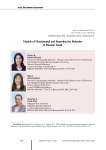
Models of matrimonial and reproductive behavior of Russian youth
Статья научная
Based on statistical indicators, the Federal State Statistics Service presented the demographic forecast of the Russian Federation until 2035. In all three forecast options (low, medium, high), natural population growth is negative, only its intensity changes. Population growth is presented only in a high forecast and is corrected by a decrease in the rate of natural decline and intensification of migration growth. It is possible to reverse the negative trends and implement the high version of the forecast if favorable conditions are created for the implementation of the marriage and reproductive behavior of young people as the main demographic resource. The aim of the study is the analytical modeling of the marriage and reproductive behavior of young people under the age of 35 based on the data of the author’s sociological research. The article is based on the methods of estimating average values according to the distributions of respondents’ answers, their ranking to determine the priority of factors. Statistical methods for measuring and analyzing social information are widely used: chi-square statistic for testing hypotheses, contingency tables (cross-tabulation), Pearson and Chuprov’s mutual contingency coefficients, as well as the concordance coefficient (multiple rank correlation). The results made it possible to implement analytical modeling of the matrimonial and reproductive behavior of young people under the age of 35, depending on the self-assessment of their standard of living, in particular, to reliably determine the impact of the standard of living of young people on their decision to start married life and have a child, to identify young people’s opinions about the significance of motives to postpone the birth of a child for different groups depending on the self-assessment of the standard of living.
Бесплатно
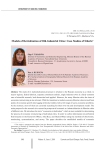
Models of revitalization of old-industrial cities: case studies of Siberia
Статья научная
The study of re-industrialization processes in relation to the Russian economy as a whole, to macro-regions, federal districts, separate constituent entities, single-industry towns is a fairly common area of scientific research, both theoretical and applied. However, for many Siberian cities the issue of economic restructuring is also relevant. With the transition to market economy Siberian cities turned from points of economic growth into lagging territorial entities with a full range of socio-economic problems. At the moment, most of them are currently searching for their own way and development model. The main purpose for the research is to assess the prospects of economic re-industrialization in Siberian cities of different size. We introduce the term “economic revitalization” which is more suitable for determining the process of economic restructuring of individual cities. In order to collect information we performed field research in the Kemerovo Oblast, Altai Krai, and Irkutsk Oblast using the methods of observation, monitoring, systematization, and survey...
Бесплатно
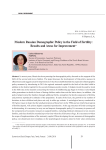
Modern Russian demographic policy in the field of fertility: results and areas for improvement
Статья научная
In recent years, Russia has been pursuing the demographic policy focused on the support of the birth of the second and more children. The paper discusses the development of this policy, assesses its effectiveness and suggests areas for improvement. It has been established that the expansion of demographic policy measures by introducing in 2011 the regional maternal capital for the birth of the third child in addition to the federal capital for the second child gave positive results. It helped extend the positive trend in the birth rate as the situation concerning the women of childbearing age began to worsen; it also helped older generations to decide in favor of having children rather than wait for better times; in addition, this policy helped extend the families through additional births, strengthen the family component of fertility, and promote reproductive attitudes of the population. In spite of the fears, the growth in the number of decisions to have children took place not only in older age cohorts...
Бесплатно
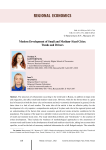
Modern development of small and medium-sized cities: trends and drivers
Статья научная
The processes of urbanization occurring in the world and in Russia, in addition to large cities and megacities, also affect small and medium-sized cities. However, while for the former there is a great deal of research on both the inner-city environment and socio-economic development in general, for the latter there is a lack of such studies. The main idea of the article is that an effective policy for the development of a city requires a comprehensive analysis of its place and role in the regional system and an understanding of the factors that ensure economic growth and create attractive conditions for the population. The purpose of the paper is to identify trends in and drivers of socio-economic development of small and medium-sized cities. The study identified problems and “bottlenecks” in the analysis of urban development. They include the weakness of methodological approaches to the assessment of current trends and factors in the development of small and medium-sized cities, taking into account their specifics, as well as the lack of necessary statistical information for a full-fledged analysis. The scientific novelty of the study lies in the fact that we propose our own methodology for determining the trends and factors in development of small and medium-sized cities, which differs from traditional approaches by including the analysis of the distribution of cities in the regional system (according to Zipf’s law) in the dynamics and constructing a system of econometric models of the influence of factors on social and economic development. Testing the proposed approach in the Belgorod Oblast revealed a trend of divergence of small and medium-sized cities, increasing imbalances in population distribution, and the growth of small urban and rural settlements near Belgorod. The scientific hypothesis of the study is that the socio-economic situation in small and medium-sized cities is primarily positively influenced by investment in fixed capital and only then by such factors as an increase in housing stock, educational development, the work of sports and cultural institutions. The factors contributing to the social and economic development of cities are investments in fixed capital, the total number of residents, especially schoolchildren, the housing supply, and the development of sports and cultural institutions. The research findings are of practical value for the design and implementation of development policies for small and medium-sized cities in Russia.
Бесплатно

